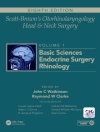Hypertension remains a leading cause of disability and death worldwide. Self-monitoring of blood pressure by patients at home is currently recommended as a valuable tool for the diagnosis and management of hypertension. Unfortunately, in clinical practice, home blood pressure monitoring is often inadequately implemented, mostly due to the use of inaccurate devices and inappropriate methodologies. Thus, the potential of the method to improve the management of hypertension and cardiovascular disease prevention has not yet been exhausted.
This volume presents the available evidence on home blood pressure monitoring, discusses its strengths and limitations, and presents strategies for its optimal implementation in clinical practice. Written by distinguished international experts, it offers a complete source of information and guide for practitioners and researchers dealing with the management of hypertension.
Jadual kandungan
1. Devices for home BP monitoring.- 2. Cuff design for home BP monitors.- 3. Home BP and preclinical organ damage.- 4. Prognostic studies of home BP.- 5. Diagnostic value of home BP.- 6. Home BP monitoring schedule.- 7. Home BP for treatment titration.- 8. Home BP monitoring, treatment adherence and hypertension control.- 9. Home BP monitoring: Cost-effectiveness patients’ preference and barriers for use.- 10. Home BP monitoring in clinical research.- 11. Home BP tele-monitoring and mobile digital health technology.- 12. Nocturnal home BP monitoring.- 13. Home BP monitoring in children, pregnancy, renal disease.- 14. Home BP variability.- 15. Home versus ambulatory BP monitoring.- 16. Guidelines for home BP monitoring.
Mengenai Pengarang
George S. Stergiou is a Professor of Medicine and Hypertension and Chairman of the Hypertension Center STRIDE-7 at the School of Medicine, University of Athens in Greece.
Chairman of the European Society of Hypertension (ESH) Working Group on Blood Pressure (BP) Monitoring and Cardiovascular Variability, he is also a member of the International Society of Hypertension (ISH) Council and Special Envoy for BP Measurement for the World Hypertension League (WHL). A member of the International Pediatric Hypertension Association Executive Committee, Professor Stergiou was elected a Fellow of the Royal College of Physicians, Glasgow, UK and won the ESH ‘Peter Sleight’ Award for outstanding contributions in research, education, and leadership. His research activities chiefly focus on BP monitoring methodologies and technologies, pediatric hypertension and antihypertensive drug actions. He has authored about 300 Pub Med articles and has 20, 000 citations in medical literature.












